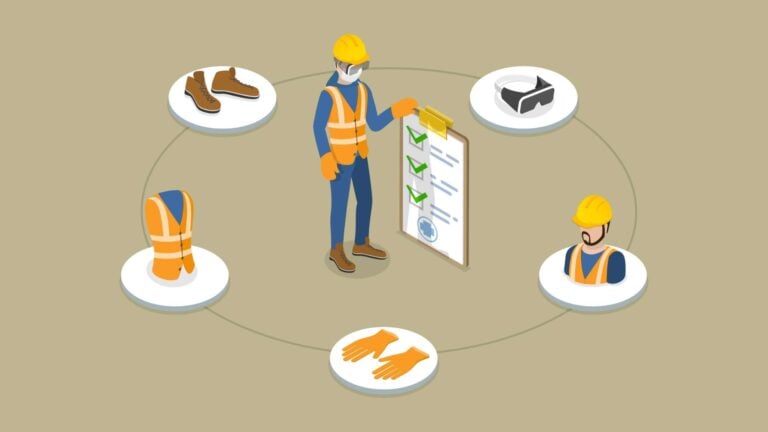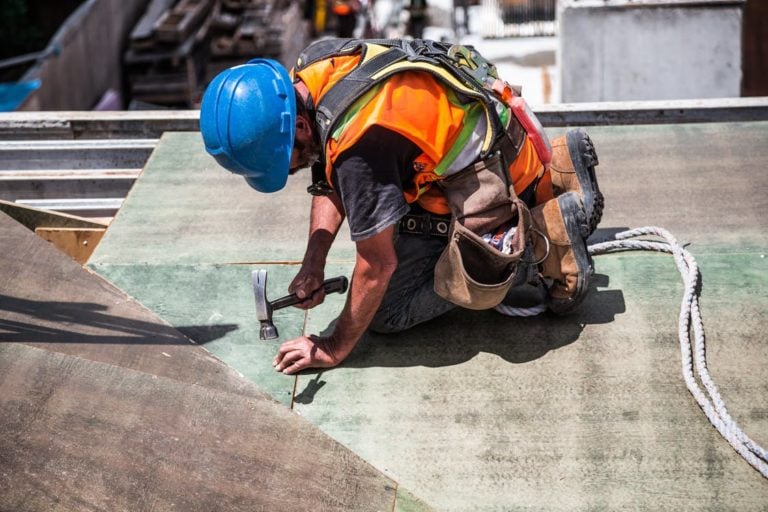Completing construction training courses can be hugely beneficial for you, your team members, and your company as a whole. We explore 10 great construction training courses so you can pick useful classes for yourself and your team.
In an industry as competitive and dynamic as construction, leveling up your company is essential. You can do this in several ways—like investing in advanced gear, adopting new technology, or hiring more employees to expand your workforce. However, few options are as impactful for you and your team members as training.
Good training helps you and your workers become safer and more skilled—leading to improved productivity, better project quality, and happier customers. Ultimately, it boosts your company’s reputation, enables you to take on bigger and better projects, and puts you ahead of your competition.
While knowing the benefits of training is one thing, knowing which courses to take is another. Whether you want to upgrade your skills or have your workers complete safety or skills training, we’ve got you covered with our list of 10 great construction training courses.
Let’s dive in!
Key Takeaways
- Training is vital to keeping your construction crew safe, compliant, and aligned on best practices. Plus, it improves morale and reduces turnover.
- Construction training can also help you and your team upskill and advance your careers.
- With a skilled and knowledgeable workforce, your business can thrive, too. You can take on bigger projects, boost customer satisfaction, and stand out among your competitors.
- Construction training programs can cover a range of topics. Most include a mix of safety training, skills training, and interpersonal development.
- The best courses depend on what you need or want to learn, so don’t stop after taking a single construction training class. Mix and match them for maximum effectiveness.
What Are Construction Training Courses?
Simply put, construction training courses are classes that help you and your construction team learn new skills or develop existing ones.
They can cover almost any topic. And with the inherent risk on construction sites, safety is usually a key component of most construction training. Many courses focus on specific construction or business skills. These can be broad and apply to the whole industry, like construction basics, or specialized for a particular line of business, like road construction training courses.
Courses can be entirely online, allowing you and your workers to complete training at your own pace. There’s sometimes an exam at the end of a course or quizzes to ensure trainees stay engaged and understand the material.
Training can also take place in person with a third-party trainer or even a manager who purchased a course. Face-to-face training makes it easy to train many people at once. However, it can be difficult to schedule for your team and typically requires a bigger time commitment and financial investment.
Construction training courses usually come with a certificate or proof of completion. These can help you comply with Occupational Safety and Health Administration (OSHA) regulations and other relevant laws.
Did You Know?
With Connecteam’s employee training app, you can create custom training courses on any topic—adding quizzes, videos, infographics, and more to each module. Workers can complete courses and review training materials anytime from their mobile devices. And as a manager, you can track training progress in real-time to ensure no one falls behind on learning.
Get started with Connecteam for free today!
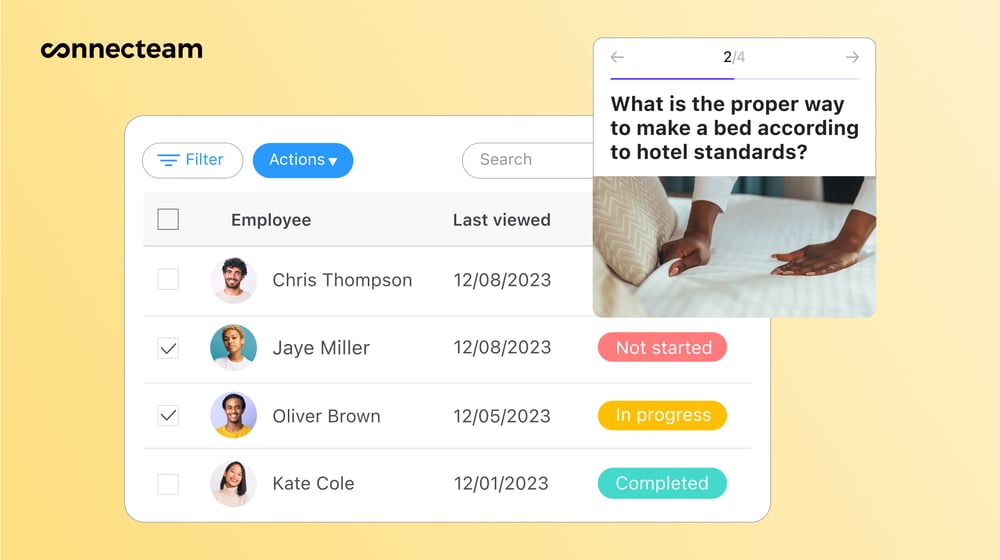
The Benefits of Construction Training
More knowledgeable team and reduced recruitment costs
Construction training helps generate expertise within your workforce. As team members strengthen their existing skills and pick up new ones, they fill in skills and knowledge gaps at your company. This makes it easier for you to promote from within, which means you’ll save money on recruiting and hiring new workers.
Enhanced safety and compliance
The risk of injuries goes down when workers are trained in safety best practices, risk awareness, and proper tools and equipment usage.
Construction safety training also helps employees feel more confident on job sites, knowing they can properly identify and avoid potential hazards. Plus, with a safer team, you reduce downtime due to injuries.
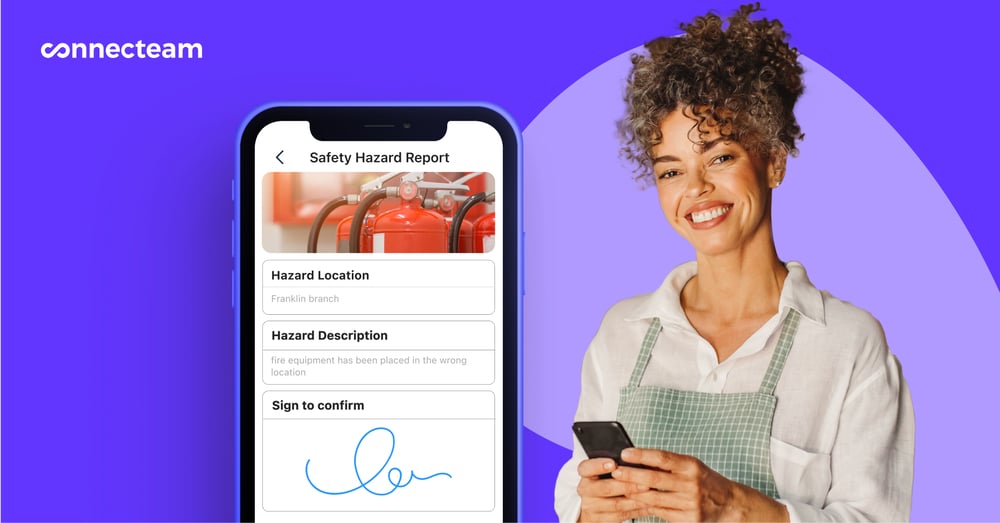
Likewise, training ensures you and your workers understand and follow the rules and regulations within the construction industry. You can stay updated on OSHA regulations and other relevant laws and guidelines. This boosts compliance and helps your company stay safe and reputable.
Increased engagement, decreased turnover
Well-trained team members are more likely to be engaged and feel connected to their work and your company. Engaged employees often go above and beyond, ensuring they work productively and contribute to organizational success.
The added bonus is that there’s a significant connection between employee engagement and retention, as engaged workers are less likely to leave their jobs. With a lower turnover rate, your business spends less time and effort hiring new employees and more time working toward company goals.
Improved project efficiency and quality
Construction training gives you and your team the knowledge and skills to complete more work in less time. You’ll learn newer, better construction techniques and be able to finish tasks with fewer mistakes. This results in higher-quality projects and faster turnaround times.
Training also helps ensure consistency across your construction projects. Everyone on your team will understand the proper procedures to follow when completing tasks, so all projects will meet the same high standards. This leads to reliable outcomes and reinforces your reputation for delivering top-notch work.
Better customer satisfaction
Through construction training, you and your team gain the skills and knowledge required to meet and exceed customer expectations. Customers who are satisfied and impressed with your work are more likely to commission new projects and spread the word about your company. This helps your business grow and become even more successful.
More opportunities
Finally, when you or your workers complete construction training, you often learn skills that open doors to new opportunities. For example, you might complete a course on advanced project management or road construction.
These additional skills expand your capabilities so you can attract new customers and take on bigger, more exciting projects. They also give you a competitive advantage in the industry, especially if other companies can’t do what your company can.
Training can also help you and your team members move forward in your careers. You can obtain the knowledge and skills necessary to move into more senior roles or a higher-paying position.
In short, training doesn’t only benefit you today—it paves the way for a brighter professional future.
10 Great Construction Training Courses
Construction Safety Basics Course
Created by: J.J. Keller & Associates, Inc.
Overview
J. J. Keller & Associates, Inc. is a management consulting company that provides safety, compliance, and regulatory solutions for businesses in construction, manufacturing, healthcare, and more. The company is also known for its high-quality training courses—like its Construction Safety Basics: Work Practices – Online Training Course.
This construction training course is perfect for training your team in high-level safe work practices. It serves as a great introduction to construction safety for your newer workers and a refresher for more seasoned team members.
The e-learning course touches on many topics, including:
- Material handling training
- Trenching and excavation training
- Safe use of equipment
- Identifying hazards
- Fire and electrical safety
- Back safety
- Preventing slips, trips, and falls
Pros
The course is available in both English and Spanish, and you and your workers can complete it using your mobile or desktop devices.
Cons
While it covers some OSHA regulations, this course doesn’t delve deeply into any topics. The company recommends using this course as an introduction and following up with other, more specialized classes over time.
Format
The Construction Safety Basics: Work Practices course is about 20 minutes long and is available in English and Spanish.
J.J. Keller also offers a handbook (in English and Spanish) with notes and quizzes that follow the course. The program is available online or in a DVD bundle with the handbook and a poster.
You may be able to integrate the course with your learning management system (LMS) so your employees can complete it within your environment.
Cost
$25 per trainee. Bulk discounts and LMS integrations are available if you contact the vendor.
Personal Protective Equipment Training
Created by: OSHA Education Center
Overview
To go further with your safety training, have your employees learn about Personal Protective Equipment (PPE). PPE includes various workplace equipment—like gloves, masks, safety glasses, helmets, and specific clothing to protect workers from hazards and minimize injuries.
There are many OSHA-approved options out there for PPE training because it’s a legal requirement for construction companies. In fact, the OSHA Education Center itself provides an OSHA Personal Protective Equipment Certificate Course.
The course covers OSHA’s regulations on:
- PPE
- Face and eye hazards and protection
- Respiratory protection
- “Head, arm, hand, foot, leg, and body protection”
- General hazard identification and assessment
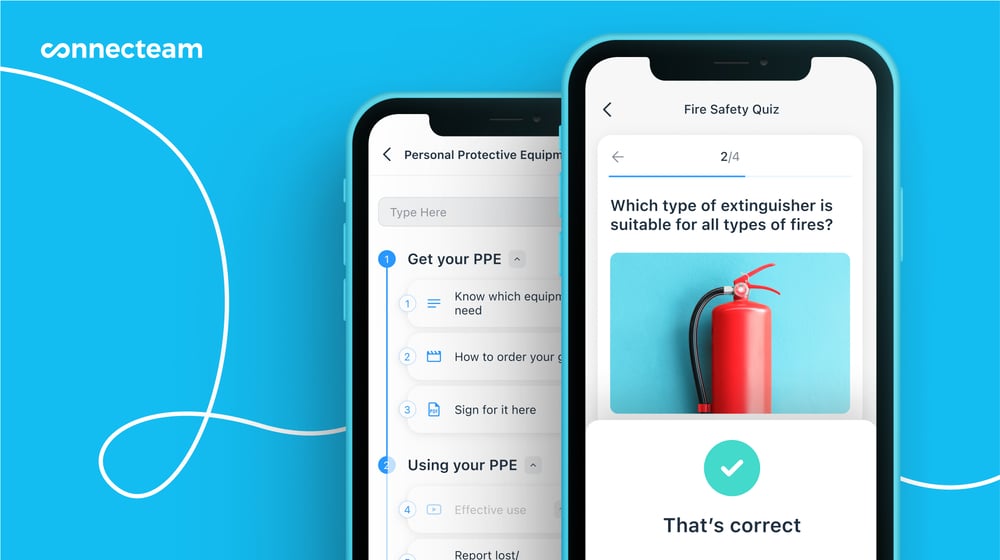
Pros
The OSHA Education Center offers access to a live trainer for questions, and trainees receive a certificate after completing the course.
Cons
You have to take the course through the OSHA website. Even if you’re an enterprise customer, you must go through the OSHA Education Center LMS.
Format
The class is about an hour long. It’s also entirely online and mobile-friendly. You and your employees can log in and out anytime as long as you complete training within 180 days (6 months).
Cost
For individuals, the price is $24.95. There are also bulk discounts and enterprise business plans available.
Aerial Lift Training
Created by: 360training’s OSHAcampus®
Overview
Falls are the leading cause of death in construction, and aerial lifts increase that risk by introducing electricity and mobility in addition to height. Understanding how to operate aerial lifts, like boom lifts and scissor lifts, is a big step toward accident prevention.
360training’s OSHA-approved Aerial Lift (Boom Lift/Scissor Lift) Operator Safety Training course is a great way to teach yourself and your workers about using aerial lifts properly. It covers the parts of the lifts, preparing to operate an aerial lift, load-capacity limits, and safety inspections. You’ll also learn to recognize and respond to safety hazards involving aerial lifts.
Pros
This course is one of the few aerial lift training options covering both scissor lifts and boom lifts (sometimes called cherry pickers). The course is also entirely online.
Cons
Some reviewers have said the training loaded slowly, which could be an issue if you need the training on a job site without great connectivity.
Format
The course is 1.5 hours long and available in English and Spanish. It’s all online, and you can complete it at your own pace for up to a year after purchase.
Cost
For individuals, it costs $79. Bulk and business discounts are available.
Pro Tip
OSHA offers a library of free resources on many topics—with a big focus on fall prevention. Gather relevant items from the library and make them accessible to your employees using software like Connecteam, which includes a knowledge base where you can store documents for easy reference.
Get started with Connecteam for free today!
Power Tool Safety Training
Created by: OSHAcademy
Overview
A course in power tool safety is useful for most construction businesses. You could even create your own power tool safety training based on the tools your team uses. However, for a deep exploration of power tools, OSHAcademy has a 5-hour course for you and your team.
The course covers safety and the proper use of power tools to prevent accidents or injuries. Section topics include recognizing hand and power tool hazards, ergonomics, selecting the right tools for the job, tool replacement and storage, and more.
Pros
Where many courses are surface-level and try to explain all power tools broadly, this class gets into the nitty-gritty of specific tools.
Cons
The training is available only in English, which may be a downside for some companies.
Additionally, most modules have graphics and photos, but trainees must read and click through the slides—it isn’t video-based.
Format
The course is estimated at 5 hours long, split into 6 modules. The trainee’s reading speed sets the pace, so it could be longer or shorter. There’s also a test at the end for a certificate.
Cost
The training content is free. The only associated cost is the certificate. It costs $20.99 to take the test for the certificate and receive a PDF version of it. Or, you can pay $32.99 for a physical copy as well.
Construction Math
Created by: MT Copeland
Overview
MT Copeland provides various online training courses for trade professionals. The company offers a construction-specific class that will get you and your team up to speed on the math you’ll see on a daily basis.
The Construction Math course covers measurement, conversions, and some basic geometry. These topics go in-depth with specific construction examples and applications, like deck and stair spacing, and calculating the area of floor plans.
This course can grow your and your workers’ skills and help you be more efficient. You’ll understand how to make accurate measurements and calculations and better cost estimations.
In addition, being able to do construction math is a key skill for those in supervisory roles, project management positions, and even specialized construction jobs. A strong understanding of construction math can help you take on more responsibility in your current position or even change job titles. Plus, it can help your workers do the same for themselves.
Pros
This course is a mobile-friendly video class taught by a professional builder. It includes modern, engaging graphics and examples that make complex topics engaging and easy to understand.
Cons
At 3 hours, it’s a bit longer than a single training session might allow for. That said, you and your workers can complete the course slowly over time.
Format
The video-based class is split into 13 modules. Spanish subtitles are available across all modules. Once you’ve completed the course, you’ll receive a certificate.
Cost
It costs $75 for 1 trainee, or $70 each for 2 or more trainees. Teams of 50 or more can get specialized business pricing.
Construction Laws and Regulations
Created by: AtHomePrep
Overview
A course about construction laws helps ensure you’re up to date with legal requirements and industry standards. A class like this listed on your resume or your company’s project bid can help clients feel more comfortable hiring you. They’ll know you and your workers will do everything correctly and according to the law.
While most states and jurisdictions have unique construction laws and regulations, there are some overarching concepts to know and look out for. A general construction law course is perfect for this, and AtHomePrep offers a great one.
AtHomePrep partnered with MT Copeland to provide its Legal Skills For Your Construction Business course. You’ll learn the fundamentals of construction law, how to read and write contracts, and legal considerations to be aware of throughout your projects. With this information, you can ensure your projects run smoothly and your business is protected from litigation.
Pros
The course covers more than just contracts. It’s also hosted by 2 construction attorneys with decades of experience. They provide “plain English” documents to make navigating the legal aspects of construction projects easy.
Cons
This class provides an overview of construction laws and regulations, but you may need to do more research for specific regulations relevant to your state or area.
Format
The video class is split into 3 modules: “Introduction to Construction Law,” “How To Read Construction Contracts,” and “How To Write A Construction Contract.”
Cost
The course is $225.99.
Carpentry Course
Created by: MT Copeland
Overview
Carpentry basics, like tool use and understanding material types, are the foundation of most frontline construction roles. While most employees likely have some experience, a carpentry course can bring new employees up to speed and serve as a beneficial refresher for more seasoned workers.
Carpentry courses are often offered at local community colleges. Most are part of a full apprenticeship that takes months, if not years, of learning and training.
However, MT Copeland offers an online carpentry training series that you and your team can complete in just a few weeks. Topics include the fundamentals of construction work, safely operating hand and power tools, common fasteners and adhesives, and structural and sheathing wood materials.
Pros
The carpentry training series covers important topics on a much smaller scale and for much less money than a full apprenticeship.
Cons
The training series isn’t comprehensive, so you’ll likely need to supplement this training with additional on-the-job coaching.
Format
The carpentry training series comprises 7 classes and totals about 16.5 hours. It’s video-based, mobile-friendly, and features construction professionals leading the classes. You can also integrate the classes with most LMSs.
Cost
It costs $525 for an individual, with discounts for larger companies.
Pro Tip
For a longer course like this one, using software to track training progress can be helpful. Connecteam, for example, gives you real-time information on employee training and lets you set due dates and send reminders.
Get started with Connecteam for free today!

Construction Project Management Training
Created by: Project Management Institute
Overview
You likely have a good grasp of your business if you’re a general construction contractor or supervisor. But even with years of experience, training and certification can greatly benefit your career. You can learn advanced tactics and best practices to improve your skills and business operations. Plus, certifications are a universal endorsement of your skills that can appeal to future employers and clients.
One of the best courses to go after is one in construction project management. The Project Management Institute (PMI) is the gold standard for project management certifications, and it offers a specialized certificate for construction leaders: the Construction Professional in Built Environment Projects (PMI-CP)™.
This certification verifies your status and knowledge as a construction professional in areas like construction methodology, minimizing risk, maximizing profit, project design and execution, and more.
You’ll follow several steps to become certified. First, you must meet the eligibility requirements. You must have worked in the construction or built environment industry for at least 3 of the last 10 years.
Then, you’ll take 4 training modules and earn 3 “micro-credentials.” Below is a breakdown of what they cover and how much they cost.
- Training Courses: 4-6 hour classes, $99 each.
- Interface Management in the Built Environment
- Scope and Change Order Management in the Built Environment
- Contract and Risk Management in the Built Environment
- Execution Planning in the Built Environment
- Micro-Credentials: 4-6 hour classes with an exam at the end, $199 each.
- Built Environment Project Communication Pro
- Built Environment Technology and Innovation Pro
- Built Environment Performance and Materials Management Pro
Once you’ve completed the courses and micro-credentials, you can apply for the certification exam. When your application is approved, you can sit for the exam.
The certification exam covers contracts management, stakeholder engagement, strategy and scope management, and project governance. It costs $499.
Pros
This certification is widely recognized, serving as a universal verification of your knowledge and skills.
Cons
The process is somewhat long, and each element—from the training modules to the exam—is priced separately.
Format
The prerequisite courses and micro-credentials are all web-based and 4-6 hours each, and the micro-credentials include an exam at the end. The overall final exam has 170 questions and takes about 4 hours.
Cost
Each course is $99, and each micro-credential is $199. The exam is $499. In total, it costs $1,588 for the entire course and certification.
This Might Interest You
For more information on certificates you or your team can seek, check out our list of 9 great construction certifications.
Road Construction Training Course
Created by: ClickSafety
Overview
Not everyone in construction builds roads, but those who do need specialized training. ClickSafety’s OSHA 10-Hour Road Construction and Infrastructure course is perfect for road builders and construction crews working on roads or highways.
It covers an introduction to OSHA, basics like electrical hazards and PPE, and special considerations for road construction safety, trenching and excavation training, and motor vehicle hazards. It will also teach you about work zone traffic control so your team can stay safe during projects. Plus, you’ll learn how to identify, prevent, and address on-the-job emergencies.
You must pass an exam after completing the course. But you get 3 opportunities to achieve a passing grade of 70% or higher, and you’ll receive instant feedback on any wrong answers.
Pros
You’ll earn a Department of Labor (DOL)/OSHA 10-Hour Card for completing the class. Additionally, the class is entirely online, so it’s convenient to take.
Cons
The training overlaps with many topics in basic OSHA courses, which can feel repetitive if you’ve recently completed other OSHA safety training.
Format
The web-based class takes 10 hours. You can log in and out as needed to complete training at your own pace.
Cost
The course costs $79.
Interpersonal Skills Training
Created by: MT Copeland
Overview
All businesses revolve around people, so soft skills (intangible interpersonal skills like communication and customer service) are always in demand.
MT Copeland offers interpersonal skills classes specifically focused on teams like yours. These include Effective Communication in Construction, Conflict Resolution, and Building Business Relationships.
With soft skills training, you can build on your team’s professionalism while giving your employees tools that can carry over to help in their personal lives as well.
These training courses are also perfect for employees looking to move into leadership roles—and people like you who are already in them.
For you, soft skills training can help you strengthen your communication skills, learn to navigate team conflicts, and understand how to foster meaningful relationships with your colleagues and clients.
Pros
Each course is led by a construction or architecture professional with real-world construction experience. The courses also include examples to keep trainees’ attention and provide helpful information. Plus, most are short—with many less than 30 minutes long.
Cons
Workers may question the value of soft skills training, so it may be more challenging to convince your team to participate.
Pro Tip
Incentivize your workers to complete training if you sense them dragging their feet. You can reward them after training or even during training when they take longer courses. Not sure what to use as an incentive? Check out these 28 ideas for effective rewards.

Format
All courses are videos in English with Spanish subtitles available. They range from 20 minutes to 1.5 hours.
Cost
The classes are $75 each. MT Copeland also offers specialized business pricing for teams of 50 or more and custom plans that can integrate with your LMS.
Conclusion
Construction training gives you and your employees the skills and knowledge needed to do your jobs safely and successfully and helps push your business above the competition. Construction courses usually involve safety, but many focus on specific training like power tool skills, construction math, project management, construction law, and more. This variety allows you to mix and match courses that work best for your and your workers.
Of course, there’s no one-size-fits-all course because every team needs a combination of safety and skills-based training. However, the 10 courses we’ve outlined here are a great place to start upskilling your team members or growing your own construction knowledge.
FAQs
Why is training important for construction workers?
Training is essential for construction workers because they need the skills, knowledge, and resources to be safe and successful on the job. It helps reduce accidents and injuries while making workers more productive, leading to fewer missed deadlines and higher-quality projects.
In addition, safety training in particular is important because it’s often a legal requirement for construction workers. Safety is the top priority on construction sites and is regulated by the Occupational Safety and Health Administration (OSHA).
Finally, well-trained construction workers can better adapt to new technologies and industry trends. This keeps teams agile and ensures businesses maintain a competitive edge.
Which training course is best for building construction?
There are many online and in-person courses to help you learn about building construction. There’s no one top option because the best training depends on what you want or need to be able to do. However, a good place to start is with an OSHA-approved safety class that will apply to most job sites.

